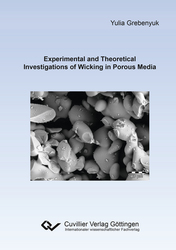| Fachbereiche | |
|---|---|
| Buchreihen (97) |
1381
|
| Nachhaltigkeit |
3
|
| Gesundheitswesen |
1
|
| Geisteswissenschaften |
2370
|
| Naturwissenschaften |
5407
|
| Ingenieurwissenschaften |
1798
|
| Allgemeine Ingenieurwissenschaften | 292 |
| Maschinenbau und Verfahrenstechnik | 863 |
| Elektrotechnik | 690 |
| Bergbau- und Hüttenwesen | 30 |
| Architektur und Bauwesen | 75 |
| Allgemein |
98
|
|
Leitlinien Unfallchirurgie
5. Auflage bestellen |
|
Erweiterte Suche
Experimental and Theoretical Investigations of Wicking in Porous Media
Yulia Grebenyuk (Autor)Vorschau
Leseprobe, PDF (110 KB)
Inhaltsverzeichnis, PDF (45 KB)
The aim of this work is to advance the knowledge on the behavior of fluids in porous materials. Wicking, or imbibition, is a spontaneous penetration of liquid into porous media due to capillary forces. Due to the challenges of the capillary transport of cryogenic liquids, the wicking of liquid nitrogen subjected to evaporation was of a special interest for this research. For that, a novel test facility was built to perform experiments in a one-species system under pre-defined non-isothermal conditions. Two one-dimensional macroscopic wicking models were proposed to evaluate the impact of the porous sample superheat, geometrical and structural characteristics as well as the impact of the vapor flow created due to evaporation. In the second part of this work, the capillary transport abilities of porous ceramic monoliths of anisotropic structure were studied. The polymer-derived ceramic samples fabricated with the freeze-casting method were characterized via vertical wicking tests. In the third part, the capillary transport properties of porous media and the wicking process were examined using the computational fluid dynamics software. The results of benchmark microscopic and macroscopic simulations may serve as a basis for further numerical investigations of fluid flow problems in porous media.
| ISBN-13 (Printausgabe) | 9783736997271 |
| ISBN-13 (E-Book) | 9783736987272 |
| Buchendformat | A5 |
| Sprache | Englisch |
| Seitenanzahl | 222 |
| Umschlagkaschierung | glänzend |
| Auflage | 1. |
| Erscheinungsort | Göttingen |
| Promotionsort | Bremen |
| Erscheinungsdatum | 05.02.2018 |
| Allgemeine Einordnung | Dissertation |
| Fachbereiche |
Ingenieurwissenschaften
Technische Mechanik, Strömungsmechanik, Thermodynamik Maschinenbau und Verfahrenstechnik |
| Schlagwörter | Wicking, Imbibition, Capillary pressure, Cryogenic liquid, Evaporation, Porous media, Ceramics, Permeability, Porosity, Pore size |








